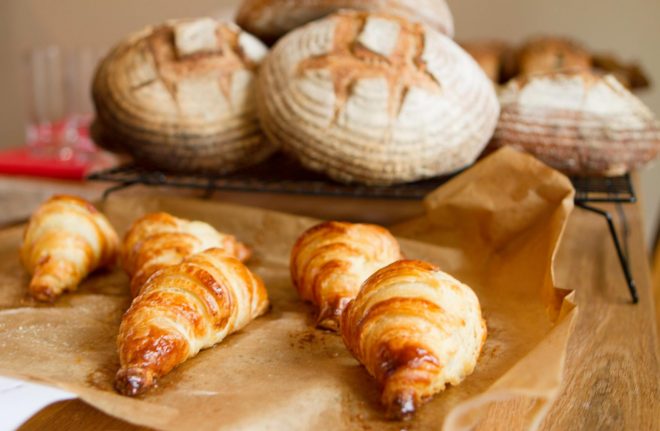
So hands up who didn’t sit through The Great British Bake Off last week with their mouth’s watering? No-one? Nope, didn’t think so. It was of course bread week, and after last year’s show stopping bread lion from contestant Paul I was expecting great things – and I wasn’t disappointed.
However I have a confession to make, much as I love watching the contestants create spectacular masterpieces week in and week out, I have no desire whatsoever to attempt it myself. Not even a little biscuit or two or even a breakfast roll. I am not a talented baker, something that tortures me on my children’s birthdays when every year I resolve to ‘make the birthday cake’ and every year we rush last minute down to the shops to choose one off the shelf after yet another baking disaster. Much as I’d love to have that magic touch – it just isn’t happening for me.
But talking about the magic touch I’ve recently been hearing a lot about a little known baker based in Aviemore in the Cairngorms National Park. The Bread Pedlar aka Lindsay would give the Bake Off contestants a run for their money. Armed with a small micro-bakery and a love of real bread with no nasty additives, The Bread Pedlar has built up a loyal fan base of her very own.

Despite baking regularly since she was a child, Lindsay’s love of bread came about after she lived in France for a couple of years where she was struck by the abundance of artisan boulangeries – one in every village, where locals would buy their bread from their local bakery on a daily basis. In France bread baking is a respected tradition, protected by French law and appreciated by loyal customers.
“I compared it to the bland, cotton-woolly British loaf, wrapped in plastic and made to last for weeks and wondered where we’d gone wrong.” The Bread Pedlar
On her return from France, Lindsay discovered the Real Bread Campaign which fights for better bread in Britain, and aims to highlight the plethora of additives, preservatives and processing aids which are added to industrially-produced bread, as well as the unnaturally accelerated production process, none of which can be good for our digestive systems.

Inspired to join the crusade Lindsay set up The Bread Pedlar in 2015 with the aim of giving local people access to real bread; a bread made using slow fermentation methods and without artificial additives or preservatives.
A move to the Cairngorms National Park was the icing on the cake and when not baking The Bread Pedlar spends her time in the great outdoors, exploring the mountains and taking in the scenery from her bike.
I love to cycle and try to deliver my bread by bike when time- and weather conditions allow!
The Bread Pedlar
One year on and she supplies a range of local shops (Elephants in the Pantry in Grantown-on-Spey, Dows and the Osprey Café in Boat of Garten, and Deli Mair in Aviemore) and has a stream of regular customers who take great delight not only in Lindsay’s bread creations, but also her sweet and savoury treats including: Date and walnut rye sourdough, Oat, raisin and honey bread and Milk chocolate peanut butter buns.
Feeling hungry yet?

If you’re planning a trip to the Cairngorms make sure you get your order in, but you’ll need to join the queue. www.facebook.com/breadpedlar
In the meantime, for those more gifted in the baking department than me, here’s one to try at home, direct from The Bread Pedlar…
Rosemary & Cranberry Bread
Makes 1 large or 2 small loaves
Ingredients
600g strong white bread flour
400g warm water
5g quick yeast / 8g active dried yeast
10g sea salt
1 tbsp olive oil
2-3 sprigs of rosemary, leaves stripped and roughly chopped
2 good handfuls of cranberries
Method
In a large bowl mix together the flour, salt and yeast. Add the water and roughly mix it into the flour. While the dough is still lumpy add the oil and knead well until it feels smooth and pliable. Don’t be tempted to add flour if it feels sticky – persevere and it will come together.
Add the rosemary and cranberries and knead for another minute or two to incorporate well into the dough.
Return the dough to a clean bowl, cover with cling film or a plastic bag and leave in a draught free place, for it to double in size (this should take about an hour but might be longer depending on how warm it is).
Turn dough out onto a lightly floured surface and gently press all over with fingertips to deflate.
Shape the dough by pulling it gently into a long slightly flattened cylinder and folding it like a letter (fold one end in by a third then fold the other over it). Put it into a 1kg/2lb bread tin or place it on an oiled baking sheet with the seam side down.
Cover with a plastic bag again and leave dough to prove for about 40 minutes in a warm place. Preheat the oven to 220 degrees C (conventional) or 200 degrees C (fan).
Once the bread has proved, bake for about 45 minutes until it sounds hollow when tapped on the bottom.

Join our Mailing List
Sign up to get notified of the latest deals, news and all the latest information direct to your inbox.
